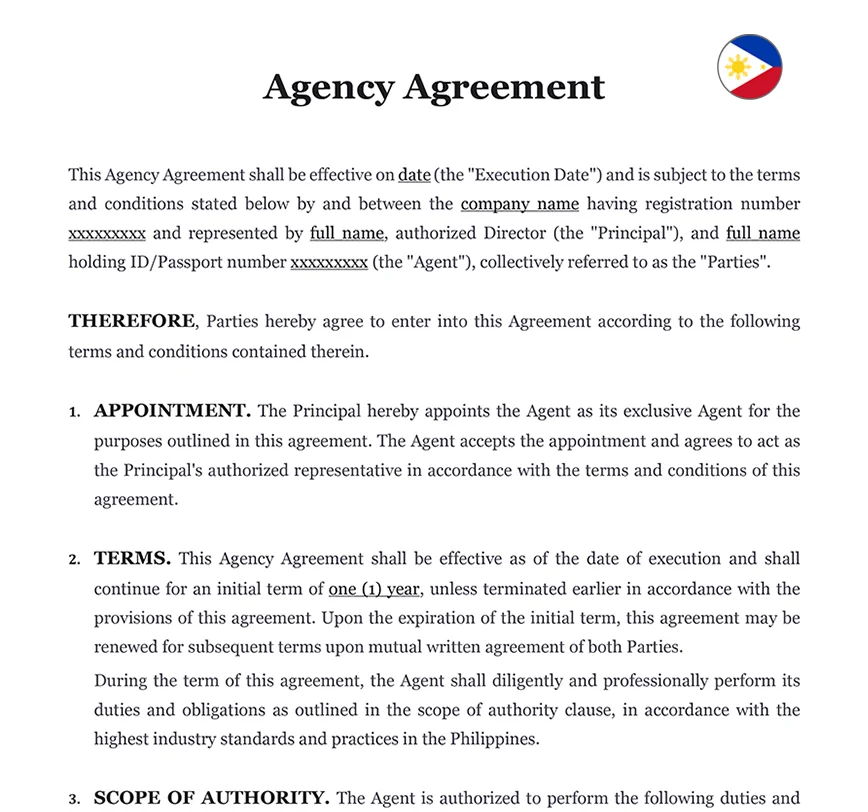Ready to use legal template
Drafted by experienced lawyers
Compliant with Filipino law
Ready to use legal template
Drafted by lawyers
Compliant with Filipino law
Home › Business contracts › Agency Agreement
Learn more about Agency Agreement in Philippines
Using an Agency Agreement in the Philippines offers businesses a powerful marketing advantage. By partnering with skilled and knowledgeable lawyers, businesses can tap into their local expertise and networks to effectively promote and sell their products or services. This agreement serves as a strategic framework that enables businesses to expand their reach and penetrate new markets, leveraging the agent’s understanding of local consumer preferences, cultural nuances, and market dynamics. With agents acting as brand ambassadors, businesses can establish a strong presence in the Philippine market, gaining a competitive edge and driving sales growth.
Table of contents
What is an Agency Agreement?
How does Agency Agreement work in the Philippines?
When to use an Agency Agreement in the Philippines?
What should an Agency Agreement include?
What are the Legal Considerations for Agency Agreements?
How to protect your business interests with an Agency Agreement?
How to terminate an Agency Agreement in the Philippines?
What is an Agency Agreement?
An Agency Agreement is a legally binding contract between two parties, the principal and the agent, where the agent is authorized to act on behalf of the principal to perform specific tasks or represent the principal’s interests. In the Philippines, an Agency contract establishes a formal relationship between the principal and the agent, outlining their respective rights, obligations, and responsibilities.
How does Agency Agreement work in the Philippines?
In the Philippines, an Agency Contract operates by granting the agent the authority to act on behalf of the principal in carrying out certain tasks or making decisions. The agreement defines the scope of the agency relationship, including the authorized activities, limits of authority, and duration of the agreement. The agent is expected to act in the best interests of the principal, following the instructions provided and fulfilling the obligations outlined in the agreement.
When to use an Agency Agreement in the Philippines?
An agency agreement in the Philippines can be beneficial for businesses in various situations where there is a need to establish a representative or intermediary relationship. Here are some instances when using an agency contract can be advantageous for your business:
1. Market Expansion: If you are looking to expand your business into new markets in the Philippines, entering into an agency agreement can be a strategic approach. By appointing an agent who has local knowledge, connections, and expertise, you can leverage their existing network to promote and sell your products or services effectively.
2. Sales and Distribution: When you want to reach a wider customer base or penetrate specific market segments, an agency agreement can help. Engaging agents who have established distribution channels and relationships with potential customers allows you to tap into their network and increase your sales and market reach.
3. Brand Representation: If you want to establish a physical presence or create brand visibility in the Philippines, an agency contract can be valuable. Agents can act as your brand representatives, showcasing your products, attending trade shows, and interacting with customers on your behalf.
4. Expertise and Local Knowledge: Partnering with agents who possess industry-specific expertise and local market knowledge can provide your business with a competitive advantage. They can offer insights into consumer preferences, market trends, and regulatory requirements, helping you tailor your business strategies accordingly.
5. Cost Efficiency: In situations where setting up a physical office or hiring a dedicated sales team is not feasible or cost-effective, an agency contract offers a cost-efficient solution. You can benefit from the agent’s existing infrastructure, resources, and expertise without incurring the overhead expenses associated with establishing your own operations.
6. Time-Sensitive Projects: When you have time-sensitive projects or limited-duration initiatives, utilizing an agency contract allows you to quickly establish a business presence and execute your plans. Agents can help expedite the process by leveraging their existing network, relationships, and local knowledge.
What should an Agency Agreement include?
A well-drafted Agency Agreement in the Philippines should include key elements such as the scope of the agency relationship, authorized activities of the agent, obligations of both parties, compensation and commission structure, termination provisions, confidentiality clauses, and dispute resolution mechanisms. It is important to clearly define the rights, responsibilities, and limitations of both the principal and the agent to avoid misunderstandings and potential conflicts.
ℹ️ Themis Partner also offers you other legal documents to help you protect your interests, such as a Distributor Agreement, Supplier Agreement or Freelancer Agreement.
What are the legal considerations for Agency Agreements?
1. Philippine Civil Code
The agency relationship is governed by the provisions of the Philippine Civil Code. It defines the rights, obligations, and liabilities of both the principal (the party granting the agency) and the agent (the party acting on behalf of the principal). It’s essential to understand the legal framework provided by the Civil Code to ensure compliance with its provisions.
2. Authority and Scope
Clearly define the scope of the agent’s authority in the contract. Specify the limits of the agent’s powers and delineate the authorized actions they can undertake on behalf of the principal. This helps avoid any unauthorized acts and ensures that the agent acts within the boundaries of their authority.
3. Compensation and Commission
State the agreed-upon compensation or commission structure for the agent’s services in the agency contract. Include details regarding the calculation, payment terms, and any other financial arrangements between the principal and the agent. Be mindful of complying with minimum wage laws and other applicable labor regulations.
4. Confidentiality and Non-Disclosure
Address the protection of confidential information and trade secrets in the agency contract. Clearly define the obligations of both parties to maintain confidentiality and prevent the unauthorized disclosure or use of sensitive information during and after the agency relationship.
Themis Partner also offers you a Non-Disclosure Agreement to help you protect your interests and stay compliant to the Philippine legislation.
5. Termination and Duration
Specify the duration of the agreement and the conditions under which it may be terminated. Include provisions regarding notice periods, grounds for termination, and any post-termination obligations. Compliance with termination procedures is essential to avoid potential legal disputes.
6. Compliance with Philippine Laws
Ensure that the agency contract complies with all relevant laws and regulations in the Philippines. This includes but is not limited to labor laws, competition laws, tax regulations, and consumer protection laws. Using legal services can ensure compliance with the specific legal requirements applicable to your industry and business.
How to protect your business interests with an Agency Agreement?
To protect your business interests with an Agency contract in the Philippines, it is crucial to clearly outline the rights, obligations, and limitations of both parties. Include provisions that address confidentiality, non-disclosure, and non-compete agreements to safeguard sensitive information and prevent the agent from engaging in competing activities. Specify the agent’s duties of loyalty and performance, and establish mechanisms for monitoring and evaluating the agent’s performance. Additionally, include provisions for dispute resolution to address potential conflicts that may arise during the course of the agency relationship.
How to Terminate an Agency Agreement in the Philippines?
Terminating an agency agreement in the Philippines should be done in accordance with the terms and conditions stipulated in the agreement itself. Here are some steps to consider when terminating an agency contract:
| ➤ Review the Termination Clause: Carefully examine the termination clause in the agency agreement to understand the procedures, notice periods, and conditions for termination. Follow the specific requirements outlined in the agreement to ensure compliance. |
| ➤ Provide Written Notice: Notify the other party in writing of your intention to terminate the agency agreement. State the reasons for termination and specify the effective date of termination as per the notice period mentioned in the agreement. It's crucial to adhere to any specified notice periods to avoid potential legal disputes. |
| ➤ Fulfill Obligations: Ensure that both parties fulfill their obligations as per the termination clause. This may involve the transfer of assets, payment of outstanding dues, return of confidential information, or any other obligations stated in the agreement. |
| ➤ Communicate and Negotiate: Engage in open and transparent communication with the other party. Discuss the termination process, any remaining obligations, and the transition of responsibilities. If both parties are willing, negotiate an amicable termination agreement that addresses any outstanding issues. |
| ➤ Seek Legal Advice: It is advisable to consult with a legal professional familiar with Philippine laws to ensure that the termination process is conducted in accordance with legal requirements and safeguards the rights and interests of both parties. |




